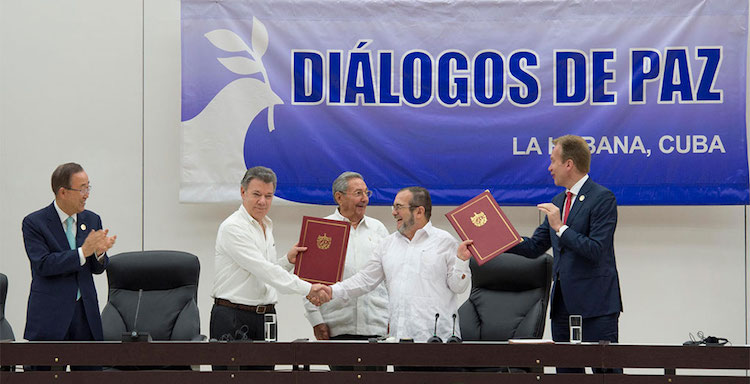
By J Nastranis
NEW YORK (IDN) – UN Women has joined Secretary-General Ban Ki-moon in welcoming the “historic” agreement signed in Cuba’s capital Havana between the government of Colombia and the Revolutionary Armed Forces of Colombia-People’s Army (FARC-EP), after 52 years of armed conflict and nearly four years of peace negotiations.
The June 23 accord “marks a definite step on the road to peace”, UN Women Executive Director Phumzile Mlambo-Ngcuka said. “It is an occasion to be hopeful for the future and to strengthen our resolve to support this exemplary peace process,” she added in a statement on June 24.
UN Women, the United Nations entity for gender equality and the empowerment of women, assured that it stands in solidarity with the Colombian women who had become an unstoppable force for peace despite suffering so much in the protracted war.
In Havana, Mlambo-Ngcuka said, the women at the table were key to making this arrangement possible. “We welcome the inclusion of a gender perspective among the principles to guide this historic agreement, and call for the leadership and protection of women throughout its implementation, including in the important task that the UN verification mission will undertake,” UN Women Executive Director said.
She pointed out that contrary to most peace negotiations in history, in this agreement women have had a significant presence and influence at the peace table itself, at the gender sub-commission formed by the women of both negotiating sides, in national forums and regional consultations throughout the country, and through the powerful testimony of victims, community leaders, and human rights defenders who have visited Havana repeatedly and have been a constant reminder for negotiators of the importance of their task.
“Their success builds on to the growing evidence that women’s participation in peace processes increases the likelihood that a peace agreement will be reached, and strengthens our argument that inclusive negotiations are not just a moral imperative or a long-term aspirational goal, but an urgent operational necessity,” UN Women’s head highlighted.
She said. “This agreement serves as a promise that no more men and women from Colombia will suffer the effects of the war, but will instead contribute to generating the conditions for a peaceful Colombia where all citizens can enjoy their full potential.”
UN Women consider the Havana accord as a call to live up to the positive example set by Colombia and to ensure that, just as the peace negotiations have been different from others, the UN verification mission will also be different, more inclusive, and more respectful of gender equality.
“As we celebrate this new step and look forward to the journey ahead, let us not forget the sacrifice and effort of Colombian women, and the importance that their leadership and participation must have in the final stage of this peace process and the implementation of all agreements. UN Women stands ready to support Colombia in this endeavour,” Mlambo-Ngcuka said.
Ban, who was witness to the signing of a Colombia ceasefire agreement, congratulated the Governments of Cuba and Norway for devoting “considerable diplomatic skills” to the peace process. Together with the accompanying countries, Chile and Venezuela, they had have shown how national peace efforts can be supported faithfully, discreetly and effectively, Ban said.
He also recalled that six months ago, the UN Security Council and the Community of Latin American and Caribbean States (CELAC) had responded to the call of the Government of Colombia and the FARCP, and made a commitment to support the implementation of the ceasefire agreement and the laying down of weapons.
“The signing of this essential component of the peace agreement will strengthen this commitment. It will now be crucial to mobilize the people and resources required for monitoring and verification,” Ban said.
Acknowledging that the peace talks continue and that “significant issues” are still outstanding, the Secretary-General said he trusted that today’s achievement will provide renewed momentum towards the last phase of the negotiations. “Expectations are now high that the vision articulated in the agreements reached over the past three years will soon become a reality. I strongly encourage you to fulfil these hopes,” the UN chief said.
“We at the United Nations are determined to do everything we can, alongside the Government and the FARC-EP, to translate a remarkable negotiating process into exemplary implementation of the peace commitments made,” he added.
The Secretary-General also met with the President of Colombia, Juan Manuel Santos Calderón, during which he congratulated the Government of Colombia on the important agreement reached, noting that it was a clear demonstration of the parties’ commitment to reach a final peace agreement in the near future. They also discussed ongoing preparations for the deployment of the UN Mission in Colombia.
In a separate meeting, Ban talked with the commander of the FARC-EP, Timoleón Jiménez, discussing progress made so far in the peace talks and pending matters, including the transition of FARC-EP combatants into civilian life.
Ban also met with President Nicolás Maduro Moros of Venezuela and commended Venezuela for its role in the Colombian peace process. He called for an inclusive political dialogue in Venezuela. [IDN-InDepthNews – 24 June 2016]
IDN is flagship agency of the International Press Syndicate.
Photo: UN Secretary-General Attends Ceremony for Colombian Ceasefire Agreement, Havana. Credit: UN Photo/Eskinder Debebe











